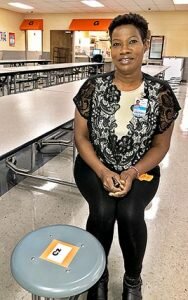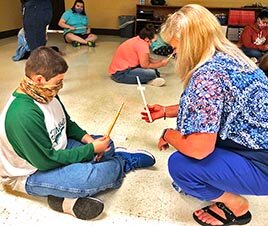Educational Assistants Praised for Their Ongoing Support
 Bobbie Lipscomb sits in the Gleason cafeteria where her help is now needed to keep students in their numbered and socially-distanced seats during meal times.
Bobbie Lipscomb sits in the Gleason cafeteria where her help is now needed to keep students in their numbered and socially-distanced seats during meal times. Regina Harrison gives a Sharon student some additional help in learning how to hold his new drumsticks.
Regina Harrison gives a Sharon student some additional help in learning how to hold his new drumsticks.BY KAREN CAMPBELL
Weakley County Schools Communications Director
WEAKLEY COUNTY (September 22) - Rose Wade held the new drummer’s hands steady, continuing to encourage him to read the music displayed on the screen at the front of the room. Next she moved to a girl who, due to her condition, was seated in a chair rather than with others on the floor and assisted as she attempted to pat out the rhythm as instructed by the teacher.
Regina Harrison bent low and worked with a young musician’s grip on the sticks, then, on her own initiative, recorded the students’ first attempt at tapping out the 1-2-3-4 beat and provided the playback.
Within the 45-minute period, the Sharon School students with special needs were in music class, “Miss Rose” and “Miss Regina” had cajoled, corrected, complimented and cared for their charges.
This wide range of functions is familiar to anyone who holds the title of Educational Assistant (EA). A majority of the nearly 90 men and women who are called EAs in Weakley County Schools are assigned to the special-needs student population. Others serve in the cafeteria or the office. Some have the role on a part-time basis and others are full-time employees.
Though assignments may vary from school to school, the shared observation from principals across the county is that Educational Assistants (EAs) are priceless.
“I would love to recognize all of them at Martin Elementary School because they are AMAZING!!” responded Patresa Rogers, MES principal. “I am one lucky lady.”
That luck includes having the longest tenured EA in the county – Sherry Wagster. She, Teresa Williams at Martin Primary and Paulette Grooms at Greenfield have logged more than 30 years each assisting in classrooms. Janice Clark in Sharon has 26 years to her credit.
Primarily positioned in primary and elementary schools, EAs also work with reading interventions, help keep order during meal times and take on office duties.
“They are passionate about working with children. They encourage students to develop a love of learning and meet students where they are academically,” notes Dresden Elementary Principal Melanie Needham of the EAs assigned there. “Since they work with students from grades K-4, they get a unique perspective of watching students grow as learners from year to year. They also make copies, assist students during lunch time, arrival and dismissal each day. Our school would not be the same without them!”
Gleason Principal Lee Lawrence said EA Bobbie Lipscomb is a good example of how EAs supplement the work of teachers, “She is an extremely hard worker and never hesitates to complete any task for our teachers. She has a loving and caring approach with all children and always has their best interests at heart."
“Miss Bobbie” can be found in a number of locations on the Gleason campus. “Whatever they need, ‘Miss Bobbie’ will be trying to do it for them,” she says of her special role with teachers.
Her focus on the lower-level reading students means she might be working with four or five second- and third-graders at a time, with the intent to improve their reading progress. Or she could be found with kindergarteners introducing them to phonemic awareness. Or she could be moving from class to class to make copies or offer teachers the chance to take a break. And finally, she helps in the lunchroom, ensuring students in the days of COVID are socially distanced and have her help in “opening milk, getting ketchup packets … just making sure they stay seated and calm.”
COVID-19 has added to the workload of all staff. However, EAs in the office are particularly aware of its impact. For instance, Natalie Cantrell at Westview keeps up with In School Suspensions, absenteeism, COVID-19 contact tracing and working with quarantining students, all of which garners Assistant Principal John Lifsey’s gratitude and praise.
High schools do not have as many EAs in classrooms. But Dawn Thompson, Kim Pierce, Shannon Roberts and Beth Hazlewood at Westview; Susan Williams at Greenfield; Sakara Milan at the Alternative School and Patrick Nesbitt at Dresden High all gain the applause of administrators due to their work with older students with special needs.
“I like helping students learn,” Nesbitt says of the position he’s held since January 2017, with assignments ranging from homework help to tutoring in Algebra. He transitioned from being a substitute teacher and says of his current long-term and fulltime commitment, “I enjoy seeing students who come in not knowing something and at the end of the year know new things. That’s what got me into teaching to begin with.”
Back to Rose Wade at Sharon, Principal Michelle Clements points out that her “assisting” goes well beyond the classroom. From guidance on how to properly put the flag out each morning, to how to change the wording on the school signs to how to cook and do laundry, Wade models giving back and encourages self-sufficiency.
“Educational Assistants are a critical part of our system,” notes Randy Frazier, director of Weakley County Schools. “Schools are called on to go well beyond classroom learning. We must focus on physical health, nutrition, emotional and social well-being. We balance meeting state standards with making sure they have the most positive learning experience possible. Our teachers can’t shoulder the responsibility without help. We are so grateful for the caliber of EAs we have throughout the county.”





